
Sit Back for a Fascinating Journey into the Psychology of Children
- From the Grand Masters' Fixation with Development Stages to the Context Focus of Today!
• See how the interest in the psychology of children today has exploded and given birth to a plethora of various parenting styles!
• Join for a brief tour through the history of child psychology and get the key points of:
- The psychosexual Sigmund Freud stages
- The cognitive Jean Piaget stages
- The moral Lawrence Kohlberg stages
- The psychosocial Erik Erikson stages
Child Psychology Today has Descended from Its Former Residence in Its Academic Ivory Tower and Entered the Public Park
"The psychology of a child" ... Everybody knows something and everybody has an opinion!Today, more than ever, we are interested in the psychology of children. You may see this in the abundance of readily available child psychology articles on the internet (like this one) and in your local supermarket.
In this way the interest in the psychology of the child is not only reserved for child experts, pedagogues and psychologists anymore, it is also a subject that many parents feel they ought to know just a little bit about in order to provide their child with the best conditions possible.
Many parents feel that knowing how your child's mind - works and when to expect what in terms of psychological child development - is a natural part of raising children: Knowing something about
child psychology is often something we feel is part of our responsibility as parents.
Child Psychology is a Giant Public Buffet
- Why not Keep It That Way!
Some people find this explosive interest in child psychology and parenting styles disconcerting, saying it puts too much pressure on the parents "to do the right thing".Sure, it may sometimes feel like a pressure - am I doing a good enough job as a mom or dad? However, no matter what we do and engage in, we will always question ourselves.
Also the explosive growth of the internet and free information doesn't strip people of their own will to choose and discard.
If anything, it's the other way around - with all this information available everywhere, we learn to quickly find what we need and agree on and sort out that which we don't.
Saying there is too much information around is actually wanting to strip people of their right to choose while at the same time saying that they are not capable of making the right choice for themselves.
Yes, there is a lot of 'good parenting' discourse floating around in society today - but there is always a discourse about something going on, and we always navigate through it according to our own interests ... no news there.
But that was a brief detour; let's return to the subject of
child psychology in itself.
No Child Psychology Theory Explains It All
- It's a Buffet: You Take What You Want
Sorry to disappoint you there is no unified theory that explains everything there is to know about the psychology of children.Today, compared to earlier, if anything we are presented with bits and pieces here and there that try to explain certain aspects of child psychology.
All these different aspects of the psychology of a child are integrated into a plethora of different parenting styles, such as the bonding orientated parenting style of attachment parenting or the positive psychology inspired parenting style of positive parenting and many, many more.
What is typical of the parenting orientated psychology of children today is not so much an interest in preparing the child for the roughness of adulthood but more in raising happy, responsible and conscious individuals.
This tendency is an expression of "We want more for our child that just preparing him or her to do well out in society and fit well into certain roles ... we actually want our child to be happy with who he or she is!"
Positive parenting and attachment parenting is driven by a desire to try to provide the child with the best conditions of having a deeply fulfilling life rather than just a liveable one.
But enough of parenting talk for now, let's return once more to the issue of child psychology:
The Grand Old Masters' Views on Child Psychology:
1) Utter Fascination with Stages: When Does What Happen?
2) Seeing Life Through a Lens of Malfunction: What Can Go Wrong and What Are the Effects?
Historically speaking, just like in the field of traditional psychology theory, the field of the psychology of children has been very concerned with developmental malfunctions and the question: 'What can go wrong?'
Most 'old' theories in the history of child psychology are very preoccupied with neatly squeezing the psychology of a child down into different developmental stages rather rigidly defined by age.
Also, the view on the development of the psychology of a child used to be quite black and white:
- The Healthy Path: If the child fitted well into the psychological stages, went through what the child needed to go through in theory, the child was considered healthy and later adult life would probably be a walk in the park!
- The Troubled Path: However, if the child didn't fit into the box or didn't healthily complete a certain stage of development, the child would most likely be charged with unfortunate complexes and facing serious challenges in adult life (this seems to be especially true of the Sigmund Freud theory, among other things).
The Idea of the Fragile Child Has Been Superseded by that of a Strong and Resourceful Child
Many premises of the early child psychology theories were that the child was very vulnerable.
A prevalent idea was that it only took one bad thing - a particular event or a particular mal-completed stage - to do 'serious damage' to the psychology of a child.
Today, practical child psychology research has fortunately proven that the psychology of a child is much more complex and a lot less fragile.
Now, allow me to give you a brief tour through the fascinating history of child psychology by presenting some of the old high-ups in early child psychology theory.
The Sigmund Freud Stages:
- The Child Is Driven by Pleasure Seeking, Sexual Energy
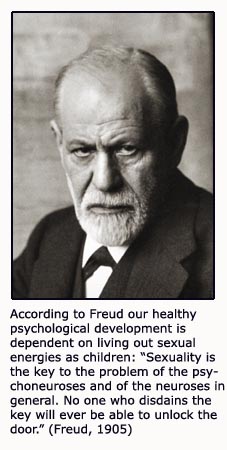
One of the earliest, but also most controversial theories about child psychology, we owe to our good old friend Freud (1856-1939) and the field of psychoanalysis.
The Freud theory held that a child had to go through certain psychosexual developmental stages in order to develop a healthy personality as an adult.
According to Freud all children are driven by psychosexual energy, the libido, which determines their behavior at different ages and stages.
During each developmental stage the child is driven by sexual instincts to have certain basic pleasure needs fulfilled via the body's erogenous zones and the skin.
Freud mapped out 5 different stages of the psychology of children. Here is a very condensed overview:
- The Oral Stage (0-18 months): The child's pleasure focus is centred around the mouth and in sucking.
- The Anal Stage (18 months - 3 1/2 years) : The child is presented with toilet training and starts to control bowel movements and supposedly finds pleasure in giving way to and holding back faeces. On a broader level this phase is about controlling behavior and strong impulses.
- The Phallic Stage (3 1/2 years - 6 years) : Children discover that boys and girls are different. Boys become obsessed with their penises and fear castration and girls supposedly suffer from penis envy. Also there is an attraction to the parent of the opposite sex, hence the possibilities of Oedipus and Electra complexes.
- The Latency Period (6 years - puberty) : At this stage the sexual energy is quite calm and the child pursues sports, hobbies and same sex friendships.
- The Genital Stage (puberty - adulthood) : Once again the focus returns to the genitals and on developing healthy relationships with the other sex.
If a child did not go through or complete a certain stage, Freud believed that aspects of the child's mentality would get stuck and later in life become 'fixated'.
'Fixated' means regressing to a certain type of infantile behavior that was typical of a certain childhood stage. For instance if you were 'stuck' in the oral stage, as an adult you may be driven by a need to constantly have something in your mouth: a cigarette or a bottle for instance.
Perspectives on the Freud Theory Today:
First of all, Freud has been criticized for boiling everything down to sexual energy, the libido, saying that if we develop healthily, it's because we got to live out our libido as kids - and if we develop unhealthily, it's because for some reason our sexual energy was blocked or repressed.
Also there's the question of: How do we know that a certain specific deprivation or event is the reason for how we behave today? For instance there's no certain way of knowing whether there's a direct relationship between being a heavy smoker today and having had a traumatic weaning experience as an infant.
Today it is recognized that who we are and how we behave is much more complex.
The Jean Piaget Stages:
- A Child's Mental Processing Develops According to Age
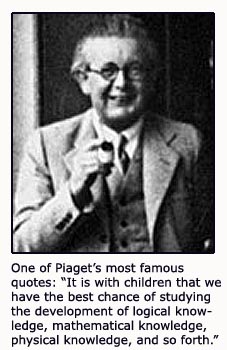
Like Freud, Swiss Psychologist Jean Piaget (1896-1980) was also interested in putting child psychology neatly into developmental stages.
Piaget developed a cognitive theory to help us understand how the psychology of children works in terms of how children understand and think about the world.
In his developmental theory, Jean Piaget delineated 4 developmental stages a young child goes through chronologically.
He believed that a child had to fully complete one phase before diving into the next. Also he postulated that the ages in the phases were universal and therefore 'applicable' to every culture.
Very briefly put the Piaget stages of child psychology are as follows:
- The sensory-motor stage (0-2 years): The child experiences the world only through his or her senses.
- The preoperational stage (from 2-7 years): The child can take in words and concepts but cannot process them. The child's mind is still only intuitive, not yet logical.
- The concrete operations stage (from 6-12 years): the child is starting to understand symbols and concepts on a concrete level. The child can do systematic and logical thinking but again only on a concrete level.
- The formal operation stage (12 + years): The child is now able to understand abstract concepts more or less like an adult.
Perspectives on the Piaget Theory Today:
One of the most criticized points in Piaget's theory is his fixation on age.
Recent child psychology research has documented that he often underestimates children's mental abilities. For instance at the preoperational stage children typically have a lot more self-awareness and awareness of other people's thoughts than he gives them credit for.
Even though later child psychology research has undermined some of Piaget's points, the very idea that children simply think differently than grownups, that their minds work in a different way than adults, was new at the time.
The Lawrence Kohlberg Stages:
- Moral Development Is a Lifelong Process!
American psychologist Lawrence Kohlberg (1927-1987) developed a theory about how children and adults go through a lifelong process of moral development and thinking.
Like other early child psychology theorists he wanted to meticulously map out different developmental stages. And he was convinced that one chronologically went from one stage to the next - there is no skipping stages.
Now hold on tight because now we're going down a rather abstract road:
Level 1
- The Child Is Serving His or Her Own Self
Interest
- 1) Obedience and Punishment Orientation: The child's reasoning is done out of obedience to authorities and the fear of punishment for being disobedient. 'Right' and 'wrong' are not questioned, they are embedded in the rules you have been told to obey.
- 2) Individualism and Exchange: Here the child acknowledges that individuals have different opinions and that one is free to pursue one's own interest. Exchange and favors are thought of as useful ways to achieve something.
Level 2
- The Child / Young Person Is Orientated Towards
Others' Wellbeing and the Well-Functioning of Society:
- 3) Good Interpersonal Relationships: The motive here is being a good person: being good to other people. Judgements are made from evaluating 'what is good ethics' in terms of having a responsibility for the wellbeing of others: 'It's our duty to do our best to help others.'
- 4) Maintaining the Social Order: Here the motive is still responsibility for something outside yourself, but the focus is not on individuals but on the well-functioning of society as a whole.
Level 3
- The Person Is Guided by Ethical Values and
Abstract Ideals:
- 5) Social Contract and Individual Rights: Here society's values and principles are evaluated and judged according to what is considered basic human rights.
- 6) Universal Principles: This stage is characterized by fairness also. Here the aim is to be objective, and decisions are judged from principles of justness. All people are equal and should be treated with equal respect.
Perspectives on the Kohlberg Theory Today:
Kohlberg suggests that his theory applies to all cultures. In this way he may be considered 'ethno-centric'.
Ethnocentric is a sophisticated word for applying a western yardstick for all other cultures: What is considered an ideal of morality in the West is not necessarily an ideal to e.g. African Bushmen.
Most likely other cultures have other ways of measuring morality.
The Erik Erikson Stages: Reaching Full Development is Successfully Completing the Challenges Inherent in the 8 Stages
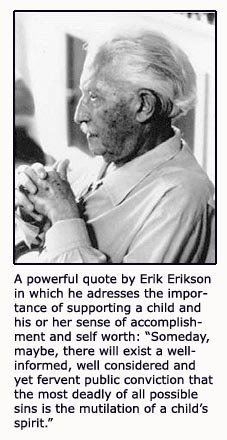
Danish-German-American psychologist Erik Erikson (1902-1994) presents us with a psychosocial theory of a whole of 8 developmental stages.
These stages are also characterized by having either a positive or negative outcome.
One of the determining factors in the development of the psychology of a child is support, encouragement and accept by the immediate surroundings, especially the parents.
Like in many of the other theories of child psychology, each stage has to be successfully completed before the child can move on to the next stage.
Just like Freud, Erik Erikson believed that if for some reason a child didn't complete a certain stage, problems were bound to occur later on in life.
Very shortly put the stages are as follows:
- 0-1 years - Trust vs. Mistrust - Strength: Hope:
The infant is completely dependent on his or her parents to met his or her needs. If the child is met with consistent and sensitive responsiveness, the child will learn that people in general and the world can be trusted.If the child feels he or she cannot rely on his or her parents, there is a risk of developing general mistrust in people.
- 2-3 years - Autonomy vs. Shame & Doubt - Strength: Will and Self-control:
As the child grows, he or she becomes more capable of doing things by himself or herself. If parents encourage this independent behavior in a successful manner, the child develops healthy autonomy and a positive self image.It the parents make too many demands on the child and the child consistently fails - or if the parents make fun of the child's efforts, the child may develop shame and starts doubting his or her own skills.
- 4-6 years - Initiative vs. Guilt - Strength: purpose:
The child is now developing a firmer sense of purpose and goal orientation in his or her actions. The child start planning actions more and judging them as well.And if the child doesn't succeed in his or her endeavors, Erikson says the child may feel guilt, which is a new emotion.
- 7-12 years - Industry vs. Inferiority - Strength: Competence:
The child's abilities and skills are still developing rapidly and now the child is capable of putting more perseverance and focused effort into his or her tasks.If the child is supported positively in this, the child is likely to develop more self confidence which again makes the child want to learn more. If not, the child may feel a sense of inferiority and failure.
13-19 years - Identity vs. Role confusion - Strength: Fidelity:
The child is more concerned now with who he or she is in relation to others and the community: "How do people see me?" The young person may play with different identities and roles, which may lead to identity confusion but it may also help establish a sense of belonging. - 20-34 years - Intimacy vs. Isolation - Strength: Love:
Now a person may start developing relationships on a deeper level with partners and friends. When a person succeeds in this, he or she gets the positive effects of deep connection and the positive feeling of "someone wants me".If a person experiences failure, he or she may end up not wanting closeness because of fear of rejection. Such a fear may lead to isolation.
- 35-65 years - Generativity vs. Stagnation - Strength: Care:
The person is now starting to ask him- or herself if they are useful to others and society. "Have I contributed enough?" This may be in relation to being a good parent or contribution in work. If the person feels unsuccessful in these respects, a sense of stagnation or uselessness may grow from this. - 65 + years - Ego Integrity vs. Despair - Strength: Wisdom:
The person now looks back on his or her life and evaluates it in the light of happiness and productivity. If the retrospect is positive, a sense of meaning and integrity may result, if not, there's a risk of hopelessness.
Perspectives on the Erikson Theory Today:
Erikson's theory has gained much approval in the sense that 'finally there is somebody who attach weight to not only childhood experiences but also adult experiences when defining 'who we are'.
Most criticism of the Erikson theory is about the narrow framework of identity formation: 'Does it only happen between 13-19 of age - and what about important events and experiences earlier or later than this?
Back to
Child Psychology of Today:
- Mini Theories Beat the Grand Theories
As you may have noticed, many of the great big theories of the psychology of children had a focus on strict chronological development:
- 'How we change our mode of thinking, perceiving, feeling, relating and behaving as we grow older.
- And also there is a great focus on what happens when we go 'off course'
In the latter part of the 20th century the big overarching theories receded into the background and smaller theories based on real life observation came to the fore.
Researchers realized that the idea of having one big child psychology theory to explain it all was way too ambitious and that these 'arm-chair' theories were often too far away from the flux and complexities of real life.
The old child psychology theories simply weren't nuanced enough.
So now child psychology researchers are mostly engaged in studying specific areas in child psychology, not trying to encompass it all.
Today Things are less Black and White
Fortunately, today the child psychology is not so fixated with labelling a child as either being ill or well.
In the psychology of children there's a lot more space for individuality and differences.
This tolerance as it may be termed is also what makes it difficult to say anything conclusive about child psychology.
Here are some of the things that child psychology researchers can agree on:
- Trauma is not irreversible: Events in childhood may still be very important to a child's mental health but they are not considered as potentially 'catastrophic' and 'irreversible' as before.
- The psychology of a child is strong: It has been recognized that children are actually equipped with tremendous strength. This means that in most cases it takes more than a single event to cause 'damage'. To seriously threaten a child's psychological wellbeing it typically requires a series of negative events or changes.
- Consistent love and affection are still very important:
In this way it is still considered crucial that the child is surrounded by loving caregivers who show affection and respond sensitively to the child. This is a subject investigated in depth in
attachment theory by
John Bowlby and
Mary Ainsworth.
Even the child psychology theories by John Bowlby and Mary Ainsworth has been criticized for placing too much focus on the mother (and not other important caregivers) it does provide us with valuable insights into infant bonding and the importance of basic psychological security.
- Overarching universal theories are dinosaurs of the past: Where the old grand theorists wanted to make their theories of the psychology of children universal, child psychology research of today has proven that it is very difficult to do so.
- To understand the child, you must take in his or her life in all its aspects: The development of
child psychology is very much dependent on time, place, culture and social network. (We interact with many people (who are also themselves changing all the time) and find ourselves in many different situations in the course of the day).
This means that in order to fully understand a child's psychological and mental development it is not enough to just put on our 'mind-orientated' psychological lenses - we also need to look anthropologically at our values in society which determine what a child will be taught and when, and also understand the extent and effect of a child's entire social network.
Not an easy task, but hey, who said child psychology was easy. However it is very, very interesting indeed!
Your Positive Parenting Ally,
Birgitte

Want to stay in touch and get the latest news?
Sign up
for my free newsletter
Parent Coaching
- For Inner Peace, Clarity and a Deeper Connection to Your Child
 Being a parent can feel like a double-edged sword. Life with kids may feel like the greatest gift you have ever received, while at the same being hugely challenging, often leaving you confused, stressed and overwhelmed.
Being a parent can feel like a double-edged sword. Life with kids may feel like the greatest gift you have ever received, while at the same being hugely challenging, often leaving you confused, stressed and overwhelmed.
When we feel like this, we've lost touch with ourselves. We can't hear our own inner voice, and it's difficult to know what is 'right' for us and how to act.
I offer in-depth parent coaching to help you regain your balance and get back in touch with yourself. From a place of inner peace and clarity, your will find your own answers which will help you reconnect with your child from a place of unconditional love and acceptance.
Read more about my parent coaching here.
Where Would You Like to Go Next?
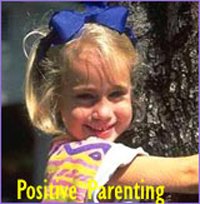 The Ultimate Positive Parenting Recipe: See the 5 Powerful Ingredients for Empowering Kids to Lead Happy and Conscious Lives! |
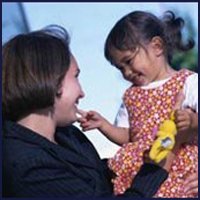 Positive Psychology Theory and Parenting: A Happiness Psychology Dedicated to What Actually Works and Makes Us Happy! |
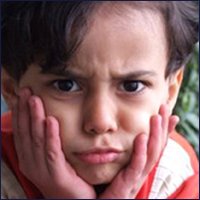 Typical Parenting Issue Resolved in 3 Steps: What Your Kid Wants, May not be What He or She Needs |
 The Power of Conscious Parenting: You're a Mirror: What You Give Is What You Get! |
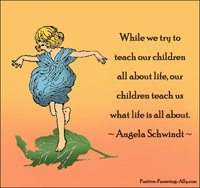 Quotes on Discipline High-Level Parenting Insights About Loving Unconditionally Beyond Discipline! |
 Conscious Parenting Discipline - The Simple Two Step Recipe We All Want: How to Respect Your Child without Compromising Yourself. |
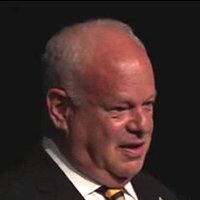 Martin Seligman: The Critic of Traditional Psychology and Father of Positive Psychology |
Back to the top of this page about Sit Back for a Fascinating Journey into the Psychology of Children - From the Grand Masters' Fixation with Development Stages to the Context Focus of Today!
Go to the Positive Parenting Ally Homepage







